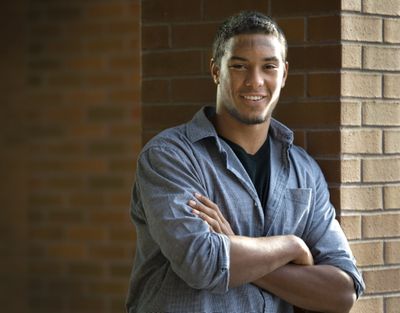A star on the football field, Ward also shines reading poetry

As after-school activities, sacking your peers on the football field and reciting Carl Sandburg’s “Chicago,” from memory in front of an audience and judges, have a little in common. But not a ton, said Langston Ward, 17.
They tap the same origins, he said – “your person, what’s inside you and what drives you” – but football involves a fieldful of teammates, not to mention sanctioned hitting. “It’s hard to put into words, but it’s exhilarating,” Ward said.
Poetry is more personal, individual. “I am making a connection with an audience, but it’s more about what’s going on inside of me and expressing that.”
That’s why he does both, said Ward, a Mead High School senior who won the statewide Poetry Out Loud competition last year and plans to try again this year. They let him express different things.
The National Endowment for the Arts and the Poetry Foundation created Poetry Out Loud to encourage students to engage with literature. In Spokane, the regional finals will be hosted Feb. 7 by Get Lit!, the literary festival organized by Eastern Washington University. The deadline for schools to register is today.
For the competition, participants choose from an online database of more than 800 poems. Ward said he moves through them alphabetically, scanning the first lines. He’s looking for language that strikes him, a personal connection, or both.
Sandburg’s “Chicago,” he said, is about being proud of where you’re from.
Ward and his mother moved to Spokane about five years ago from Tarrytown, N.Y., 25 miles north of midtown Manhattan, a year after his father, Michael Ward, died.
Ward still thinks of Tarrytown as his hometown. He left a base of friends, a more diverse population, and a community where a kid could walk where he wanted to go. But he called the opportunities he’s had at Mead a “blessing” – the football team, the poetry competition, the teachers who fostered his passion for American government. He made new friends. He played the cello. He started singing.
As an athlete, he was recruited as a defensive end – his position at Mead – to play for Harvard. He learned a couple of weeks ago he’d been accepted by the university, and he’ll head to Cambridge, Mass., next fall.
Ward comes from a family of athletes whose experience, his mother said, led to a wariness when it came to sports and children – and led her to encourage Ward and his sister, Gabrielle Ward, now 24, to pursue a diversity of experiences.
Tracy Ellis-Ward played college basketball and went on to work in sports administration, including at the National Basketball Association. Michael Ward played college football and became a coach. They saw coaches who pushed young people too hard for the wrong reasons, she said. They saw burned-out athletes.
“Even at the pro level, when I was at the NBA – that’s all they’ve ever done,” Ellis-Ward said. “You kind of wonder, well, what are you doing for fun? What are you doing to develop your whole self? Sometimes the sports can be all-consuming.”
She gave her children a rule, Ellis-Ward said: You had to do something after school. It could be drama, it could be track, but you weren’t coming home at 3 p.m.
He never did do drama, and his Poetry Out Loud performances end up being pretty much how they start out, after he chooses the poems, he said.
But in a video of last year’s Poetry Out Loud competition, Sandburg’s “my city” becomes Ward’s city. When he says he has seen the marks of wanton hunger, you believe him.
He recites the poems as he hears them in his head, he said, and how he imagines the author meant them to be heard.
Melissa Huggins, director of Get Lit! programs, said Poetry Out Loud judges look for students’ personal connection with the poems, but also an intellectual understanding of the poems’ cultural or historical context.
By performing a poem, students make it their own, Huggins said.
After the competitions, Ward “just kind of smiles and is like, ‘OK, what’s next?’ ” Huggins said. “On stage, he has quite the presence.”